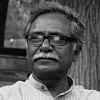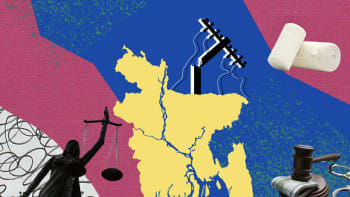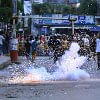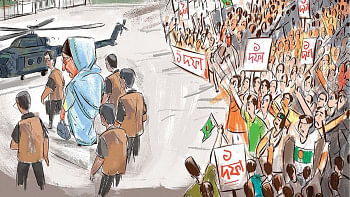The unfinished journey of Drohojatra

In the face of the people's collective power, the coercive tools of the state—police, law, curfews, propaganda, RAB, military, Section 144—become powerless. When people take to the streets with unity and determination, these mechanisms collapse. That moment of truth—when fear is cast aside and resistance becomes collective—is what we call a mass uprising.
Bangladesh has experienced such moments before: in 1952, 1969, 1971 (when people's resistance turned into an armed Liberation War after the Pakistani forces started committing genocide), and in 1990. And then came July 2024. In each instance, the strength of ordinary people overcame repressive regimes. But in every case, we have also seen how those moments of possibility have been derailed or co-opted, either by betrayal from within or by the failure to sustain the momentum.
The most recent uprising toppled the Hasina-led government on August 5, 2024. Just three days later, an interim government led by Mohammad Yunus took office. Expectations were high. However, on August 2 last year, at the beginning of Drohojatra, just before the transition, I had warned that removing Hasina and the Awami League would not automatically result in people's empowerment. Without dismantling the structures of power and dominance that had been built over the years, the risk of reverting to old patterns remained high.
That warning was not pessimism—it was based on historical experience.
One year later, these fears have proven justified. The promises of a new beginning have begun to fade. The interim government, in its own way, has repeated many of the same practices of previous regimes: repression of dissent, evasion of transparency, backroom deals, disregard for justice. Many who actively took part in the uprising—workers, women, students, the poor, and minority communities—find themselves once again under attack.
The very people who made this political shift possible are being silenced or sidelined. Female worker Champa Khatun became the first martyr under this government. Auto-rickshaws have been flattened in mass drives. Villages have been raided. Protesters have been shot. And all the while, those in power try to justify this violence using the same language of "stability" and "order" used by previous regimes.
The mass killing of July 2024 is still waiting for credible justice. Proper investigations are yet to be completed. Many of the injured have suffered from a lack of proper attention and treatment. Meanwhile, thousands face harassment, threats, and financial pressure from fabricated cases filed against them. Extortion and the everyday fear of speaking out continue. Mob violence has become a regular practice to get one's way—be it to punish someone illegally, grab a position of power, acquire land, or make money. All the old habits persist under a new banner.
And like the Hasina government, the current administration has shown little respect for democratic processes when it comes to policy decisions. The Chattogram Port is being handed over to a foreign company without open tenders. LNG import deals are being signed behind closed doors. An order has been officially placed to purchase 25 Boeing aircraft, without any public discussion or explanation. Whose interests are being served by these decisions?
The government makes public statements against Indian domination, but key deals like the Adani power contract, the Rampal coal project in the Sundarbans, and the controversial transit agreements have not been cancelled. The US, meanwhile, is emerging as a growing military and strategic partner. Secret agreements are being signed. The same policy of subservience to global powers continues, now with slight variations in tone. Dependence on the World Bank, IMF, ADB, and JICA for policy formulation and determining the development path remains the same, thus leading to the same outcome as before. The sources of increasing inequality, environmental destruction, corruption, and erosion of public rights remain the same too.
This is not a break from the past; it is a continuation of the same ruling logic, repackaged. The names have changed. The structure remains.
This is why the struggle cannot end with the fall of a government. It must be a deeper, more committed fight for justice, equality, and democracy in every sense. The state must take responsibility—responsibility for the judicial process for July killings; responsibility for the fabricated cases; responsibility for the culture of impunity that continues to dominate our institutions.
It must also commit to not signing any long-term deals—on ports, defence, ICT, energy—without public debate and transparency. It must stop the harassment of women, minorities, and gender-diverse communities, both online and offline.
Democratic transformation is impossible without dismantling the corrupt alliance of money, muscle, and communalism in politics. Electoral reform is needed at every level, from local government to the national parliament. But that is only one part. We need institutional changes in the judiciary, administration, and law enforcement. Without these, any election is merely a change of faces.
At the same time, there is a growing attempt to distort history. Forces that claim the 1971 Liberation War as their own have used it to silence dissent and loot resources. They have turned a people's struggle into party property. That must be resisted. The Liberation War belongs to the people, just as the 2024 uprising does.
These struggles—1971, 1990, 2024—were not isolated events. They are part of a continuum. But each time, the people have paid the price, and others have taken the gains. We cannot let that cycle repeat itself.
To build a just and inclusive Bangladesh, we must confront the four key areas of discrimination that structure our society: class, religion, ethnicity, and gender.
Class: Economic inequality continues to increase. The majority of people continue to suffer, while the rich grow richer.
Religion: Discrimination persists both between and within religious communities.
Ethnicity: Non-Bangalee communities remain marginalised and underrepresented.
Gender: At every level—home, street, institution—patriarchy continues to dominate.
Until these axes of inequality are addressed head-on, no amount of electoral change will bring true freedom. And unless people remain mobilised, active, and organised, the forces of autocracy will return, again and again.
This is why the movement must go on. It is not over. It cannot be over.
Our struggle is not just for one country or one moment—it is part of a global struggle for justice and dignity. The resistance here echoes the resistance in Palestine and beyond. And just as our uprisings inspire others, we too draw strength from global movements.
The future depends on us. The path ahead is difficult. But the people of this land have shown time and again that they can rise. Now, we must ensure that this time, we do not let that rising be captured, diluted, or destroyed.
We continue.
Anu Muhammad is a former professor of economics at Jahangirnagar University.
Views expressed in this article are the author's own.
Follow The Daily Star Opinion on Facebook for the latest opinions, commentaries and analyses by experts and professionals. To contribute your article or letter to The Daily Star Opinion, see our guidelines for submission.

 For all latest news, follow The Daily Star's Google News channel.
For all latest news, follow The Daily Star's Google News channel. 







Comments